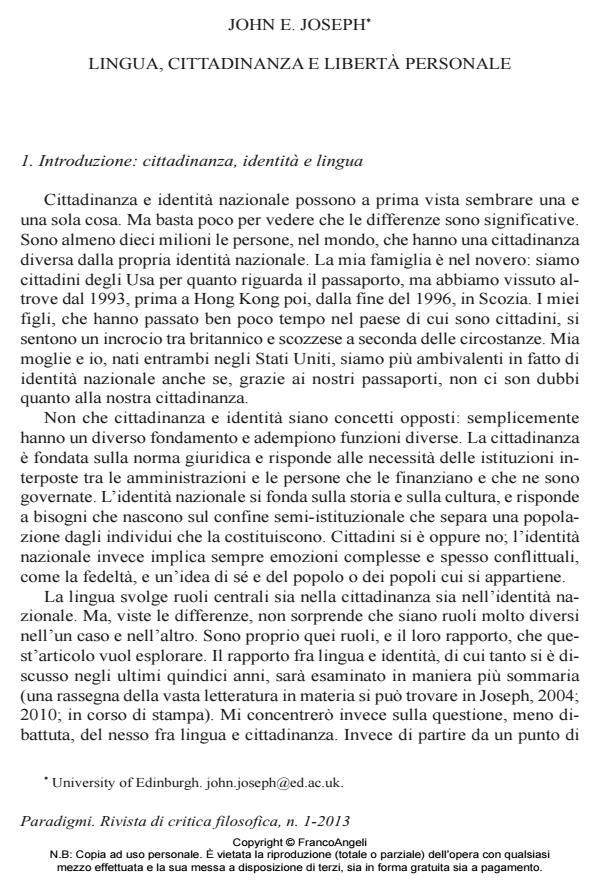Language, Citizenship, and Personal Freedom
Journal title PARADIGMI
Author/s John E. Joseph
Publishing Year 2013 Issue 2013/1 Language Italian
Pages 19 P. 91-109 File size 185 KB
DOI 10.3280/PARA2013-001006
DOI is like a bar code for intellectual property: to have more infomation
click here
Below, you can see the article first page
If you want to buy this article in PDF format, you can do it, following the instructions to buy download credits

FrancoAngeli is member of Publishers International Linking Association, Inc (PILA), a not-for-profit association which run the CrossRef service enabling links to and from online scholarly content.
Citizenship has its basis in law, and fulfills the needs of the institutions that lie at the interface between governments and the people who fund them, and whom they serve. National identity has its basis in history and culture, and fulfills those needs that arise at the only semi-institutionalised interface between a people and the individuals who constitute it. Language has central roles to play in both citizenship and national identity, but there is a particular paradox in the case of language and citizenship: accepting the language of the receiving country potentially compromises their personal freedom to maintain their linguistic identity. Yet rejecting that language can mean that other freedoms are denied them.
Keywords: Language and citizenship, Language and cultural value, Language and immigration, Language and identity, Language policy, Language rights
- Agha A. (2003). The Social Life of Cultural Value. Language & Communication 23: 231-73. DOI: 10.1016/S0271-5309(03)00012-0
- Agha A. (2007). Language and Social Relations. Cambridge: Cambridge University Press
- Appiah K.A. (2005). The Ethics of Identity. Princeton: Princeton University Press
- Bakhtin M.M. (1981). The Dialogic Imagination: Four Essays, ed. by M. Holquist, transl. by C. Emerson & M. Holquist. Austin: University of Texas Press
- Blommaert J. (2007). Sociolinguistics and Discourse Analysis: Orders of Indexicality and Polycentricity. Journal of Multicultural Discourses 2: 115-130. DOI: 10.2167/md089.0
- Bucholtz M. & K. Hall (2005). Identity and Interaction: A Sociocultural Linguistic Approach. Discourse Studies 7: 585-614. DOI: 10.1177/1461445605054407
- Daftary F. & Grin F., eds. (2003). Nation-building, Ethnicity and Language Politics in Transition Countries. Budapest: Open Society Institute
- Hutton C.M. (1999). Linguistics and the Third Reich: Mother-tongue Fascism, Race and the Science of Language. London & New York: Routledge
- Joseph J.E. (2004). Language and Identity: National, Ethnic, Religious. Basingstoke & New York: Palgrave Macmillan
- Joseph J.E. (2006a). Language and Politics. Edinburgh: Edinburgh University Press. DOI: 10.3366/edinburgh/9780748624522.001.0001
- Joseph J.E. (2006b). ‘The grammatical being called a nation’: History and the Construction of Political and Linguistic Nationalism. In: Language and History: Integrationist Perspectives, ed. by N. Love. London & New York: Routledge: 120-141
- Joseph J.E. (2010). Identity. In: Language and Identities, ed. by C. Llamas & D. Watt. Edinburgh: Edinburgh University Press: 9-17
- Joseph J.E. (2013). Identity Work and Face Work across Linguistic and Cultural Boundaries. Journal of Politeness Research, 9 (1): 35-54, special issue on The Interconnections between Face and Identity, ed. by P. Garcés-Conejos Blitvich. DOI: 10.1515/pr.2013-0002
- Joseph J.E., ed. (2010). Language and Politics: Major Themes in English Studies. 4 vols. London & New York: Routledge
- Klemperer V. (1949). LTI: Notizbuch eines Philologen. Berlin: Aufbau-Verlag
- Kymlicka W. (2001). Politics in the Vernacular. Nationalism, Multiculturalism, and Citizenship. Oxford: Oxford University Press. DOI: 10.1093/0199240981.001.0001
- Kymlica W. & Grin F. (2003). Assessing the Politics of Diversity in Transition Countries. In: Daftary & Grin, eds.: 5-27.
- Kymlicka W. & Patten A., eds. (2003). Language Rights and Political Theory. Oxford: Oxford University Press
- Rawls J. (1971). A Theory of Justice. Cambridge, Mass.: Belknap Press of Harvard University Press (Rev. edn, 1999).
- Sériot P. (2004). Oxymore ou malentendu? Le relativisme universaliste de la métalangue sémantique naturelle universelle d’Anna Wierzbicka. Cahiers Ferdinand de Saussure 57: 23-43
- Taylor C. (1994). Multiculturalism: Examining the Politics of Recognition. Princeton, N.J.: Princeton University Press
- Wierzbicka A. (1997). Understanding Cultures through their Key Words: English, Russian, Polish, German and Japanese. New York: Oxford University Press
- Wierzbicka A. (2008). Имеет ли смысл говорить о «русской языковой картине мира»? (Патрик Серио утверждает, что нет) [Ha senso parlare di una “raffigurazione linguistica del mondo russa”? (Patrick Sériot dice di no)]. In: Динамические модели : Слово, предложение, текст. Сборник статей в честь Е. В. Падучевой, [Modelli dinamici: parole, enunciati, testo. Scritti in onore di E. V. Paducheva], Moscow: Языки Славянских Культур [Mosca: Lingue e culture slave]: 177-189
John E. Joseph, Lingua, cittadinanza e libertà personale in "PARADIGMI" 1/2013, pp 91-109, DOI: 10.3280/PARA2013-001006